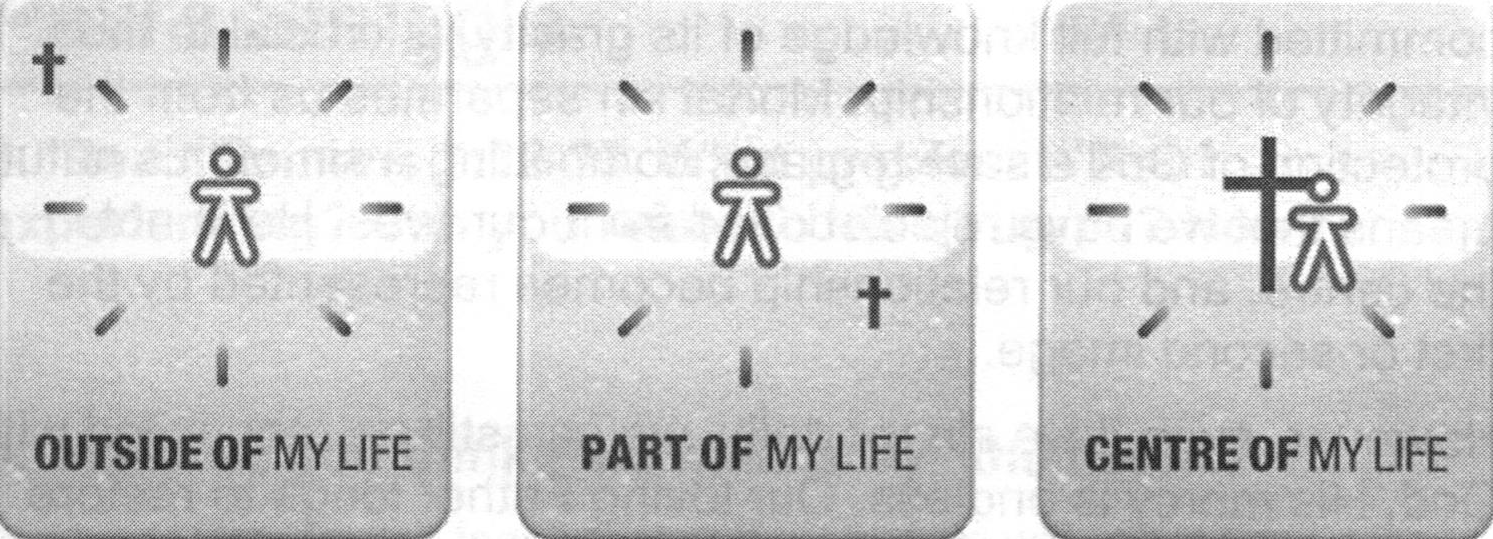 I’d like to talk to everyone here who has children. I’d like you to think, on a scale of 1 to 10, how much do you love Jesus? 10 would mean Jesus is the most important person in our life, we love Him more than family and friends, our life revolves around Him, He influences every decision and aspect of our life. 5 would mean He’s a part of our life, but our commitment is limited. We spend little time with Him; there are other things in our life that occupy more attention and energy: work, school, recreation. 1 would mean He’s outside of our life and there’s barely any relationship with Him. I’ll give you 5 seconds to think about this.
I’d like to talk to everyone here who has children. I’d like you to think, on a scale of 1 to 10, how much do you love Jesus? 10 would mean Jesus is the most important person in our life, we love Him more than family and friends, our life revolves around Him, He influences every decision and aspect of our life. 5 would mean He’s a part of our life, but our commitment is limited. We spend little time with Him; there are other things in our life that occupy more attention and energy: work, school, recreation. 1 would mean He’s outside of our life and there’s barely any relationship with Him. I’ll give you 5 seconds to think about this.
We’ve just given ourselves a number. Next question: do our children know what number we’ve given ourselves? Would they think the number is higher or lower? They might not know how much we love Jesus! Or, they might think we love Jesus more than we really do. Talk to them about this. Ask them: “How much do you think I love Jesus?” Whatever number they give will be their perception. It may not tell us the truth, but it tells us what they perceive.
We all know our children tend to imitate us. If we love hockey, they love hockey. If we love chocolate, they love chocolate. I learned to love tennis and classical music from my father. I learned my sense of justice from my father, who always stood up for the little guy. But then they also imitate our bad points. I learned to hate politics from my father. I also learned my temper from him. Children sometimes treat their mother the way they see their father treat her, or vice-versa. Have you ever said to yourself, “I’m becoming like my mom, my dad”? I remembered the time when I realized after exercise, “I smell like Dad!”
The second reading today has St. John use the phrase, “Little children” and I found out that this phrase is used nine times in such a short letter! It’s the letter, therefore, of a spiritual father writing to his spiritual children. He’s trying to form them, so that they don’t sin (1 Jn 2:1). He’s so intentional in his teaching.
This past Tuesday, we had a rehearsal for some children who are going to receive Communion for the first time on Sunday at 2 p.m. What struck me was how our parents were teaching their children. It was really impressive and it reminded me of how a good parent is very intentional in their parenting.
 A friend of mine has seven children. They’re in two batches: the oldest four, who are all grown up, and then the youngest three, who are all still in school. Of the oldest four, the two boys aren’t practicing their faith, while the two girls are. One time, my friend, the father, was sharing with me and some other fathers how he’s really being more intentional in teaching the faith to his three younger kids, because he doesn’t want the younger boys to imitate their older brothers in their lack of faith. He told us how he’s going to Confession once a month, and how he wants his children to see him at daily Mass, at the school Mass. You could see the concern right on his face.
A friend of mine has seven children. They’re in two batches: the oldest four, who are all grown up, and then the youngest three, who are all still in school. Of the oldest four, the two boys aren’t practicing their faith, while the two girls are. One time, my friend, the father, was sharing with me and some other fathers how he’s really being more intentional in teaching the faith to his three younger kids, because he doesn’t want the younger boys to imitate their older brothers in their lack of faith. He told us how he’s going to Confession once a month, and how he wants his children to see him at daily Mass, at the school Mass. You could see the concern right on his face.
The second reading and the example of my friend have really challenged me to reflect on how intentional I am in my teaching as a priest. I think everyone knows I love Jesus more than anyone, and on a scale of 1 to 10, my score would be 10.
 But then it occurred to me: since it’s the month of May and we’re bringing flowers to show our love for Mary, I think very few of you know how much I love Mary. I haven’t preached on her that much. It’s true that there haven’t been many occasions to do so, but I think it reveals a deeper lack on my part: that my love for Mary isn’t where it should be. Deep down, I know this, and it shows. One of my regrets as a priest is that the people to whom I’ve been a spiritual father don’t have as strong a devotion to Mary as I’d like. When looking back, I realize why: I never taught them well about loving Mary.
But then it occurred to me: since it’s the month of May and we’re bringing flowers to show our love for Mary, I think very few of you know how much I love Mary. I haven’t preached on her that much. It’s true that there haven’t been many occasions to do so, but I think it reveals a deeper lack on my part: that my love for Mary isn’t where it should be. Deep down, I know this, and it shows. One of my regrets as a priest is that the people to whom I’ve been a spiritual father don’t have as strong a devotion to Mary as I’d like. When looking back, I realize why: I never taught them well about loving Mary.
So, I want to be a better priest and be more intentional.
1) I want everyone to know how much I love Mary. I’ve consecrated myself to Jesus through her. I try to follow her example and love Jesus the way she did. I ask all of my petitions through her, and she and I talk a lot. I consider myself to be a Marian priest.
And I’d really like to encourage everyone to pray the Rosary. The Rosary teaches us how to pray: it teaches us how to be silent, how to meditate, to focus on Jesus. It’s a vocal prayer, which is important when we’re learning to pray, but it’s also a contemplative prayer, meaning it can bring us to deeper levels of prayer.
2) Because it’s First Holy Communion here this Sunday, I want to share with you a tip that my aunt gave me when I was 14 years old and received my first Holy Communion. She was intentional when she taught me, and it made a big difference. She taught me to receive Communion on the tongue. At the time, I just followed her advice, but it’s only years later that I’ve come to understand the importance of that advice.
Before we get into it, it’s necessary to point out that I’m not criticizing receiving on the hand; I myself have done so in the past. You can see many people receive Jesus with love when they make a throne for Him in their hands. Receiving on the tongue doesn’t make anyone holier. So what I’m recommending isn’t a command, but a suggestion, and I don’t keep track of who receives in what manner.
That said, I’ve come to realize that the sign value of receiving on the tongue is stronger than receiving in the hand.
In our current situation today, receiving Communion is very casual. Many Catholics don’t even believe that Jesus is really present; they think it’s just bread or a symbol of Jesus. I know a woman, not here, who took the Eucharist home—she wasn’t even Catholic—how did that happen? I told you once about someone trying to fake me out and pretend that he was receiving Communion.
Did you know Pope Francis doesn’t give Communion to the general public? Do you know why? He said, “On some occasions I do not give communion, I stay back and let the assistants do it, because I do not want these persons to approach me for a photo…. Such cases of spiritual hypocrisy present themselves in many who take refuge in the Church and do not live according to the justice that God preaches. And they do not demonstrate repentance. This is what we commonly call “leading a double life”.
Aware of this current state of affairs, I’ve always tried to receive Communion with love, so that I would give a good example to other people, but it hasn’t been enough. Many people, especially children, don’t get it. Then I started realizing they need a stronger sign, one that shows them they’re not receiving ordinary food. You see, when we receive Communion like ordinary food, our children may think it’s ordinary bread. But, kneeling and receiving on the tongue communicates to them that this is something different, something special. I believe that this will put our children on a great spiritual path.
However much we love Jesus will come out. Our children will generally see our love for Him, and they’ll imitate it. Don’t assume our kids know what we love and how much. Tell them, teach them, let them see you, and use whatever you can to help them. Whatever the case may be, God is calling you and me to be more intentional in our teaching.
